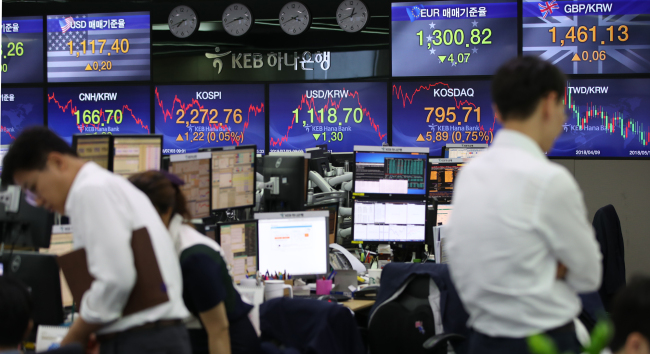South Korea’s financial market on Tuesday rebounded from Monday’s dip that had brought the top-tier Kospi and second-tier Kosdaq to the lowest in 2018.
But analysts noted the market will remain exposed to external uncertainties including persisting trade war threats between China and the US, rate hikes from the US Federal Reserve in sight and widening currency volatility.
But analysts noted the market will remain exposed to external uncertainties including persisting trade war threats between China and the US, rate hikes from the US Federal Reserve in sight and widening currency volatility.

Stock markets in Korea found bottoms in Tuesday closing. The Kospi edged up 0.1 percent to close at 2,272.76, while the Kosdaq climbed up 0.8 percent to close at 795.71 on Tuesday. This came after the Kospi and the Kosdaq retreated to the lowest in 13 months and six months, respectively, after sinking 2.4 percent and 3.5 percent Monday at closing.
The local currency moderately strengthened. The dollar-to-won foreign exchange rate came to 1,118.7 won. Tuesday, down 1.3 won from Monday. A declining exchange rate means a stronger Korean won.
Bond market was bearish. The five-year Treasury bond yield rose 38 basis points compared to the Monday session’s close, to 2.378 percent, while the 10-year sovereign bond yield jumped 47 basis points to 2.577 percent. A bond yield moves inversely to a bond price, thereby a rise in yield translates into a bearish move.
Despite rebounds, swift turnaround from downward market impacts appears unlikely, analysts said.
Since June, Korean financial markets have been under the influence of trade policy uncertainties between China and the US. While US tariffs on $34 billion of Chinese goods are set to take effect on July 6, there are growing concerns that China will seek retaliation against the measure.
The strengthening dollar, US rate hike forecast, volatility in emerging market currencies and other global macroeconomic uncertainties had also weighed on investor sentiment in the export-driven nation.
Over the past 20 trading days, the Kospi dipped 6.8 percent, while the Kosdaq sank 9.9 percent. The Korean won weakened by 43.7 won, or 4 percent, against the greenback.
Kim Sung-hwan, an analyst at Bookook Securities, called on investors to take a conservative approach to the Korean stock market for the time being, despite anticipated signs of relief from “unfavorable macroeconomic settings.”
“In July, the dollar might take a breather from the strengthening trend, while (investor woes from) US-China trade conflict could be alleviated,” Kim wrote.
“The Kospi in July will seek rebound from sharp drops, but merely to the level of recovery from the drops. Expectations on foreign capital influx should be lowered at this point.”
Another analyst, Kim Yong-gu of Hana Financial Investment, wrote in a Tuesday note that Korean stock indexes are moving below rock bottom.
“(Korean exporters’ performance) will not be free from influence of (US-China) trade conflict,” Kim wrote. “Weakening won and heightening currency volatility will raise concerns about Korean stock markets, as a negative factor of foreigner investment into Korea.”
But Kim added the recent bearish trend will be short-lived, citing zero sign of US long-term economic recession and fundamental of market players here.
By Son Ji-hyoung
(consnow@heraldcorp.com)
The local currency moderately strengthened. The dollar-to-won foreign exchange rate came to 1,118.7 won. Tuesday, down 1.3 won from Monday. A declining exchange rate means a stronger Korean won.
Bond market was bearish. The five-year Treasury bond yield rose 38 basis points compared to the Monday session’s close, to 2.378 percent, while the 10-year sovereign bond yield jumped 47 basis points to 2.577 percent. A bond yield moves inversely to a bond price, thereby a rise in yield translates into a bearish move.
Despite rebounds, swift turnaround from downward market impacts appears unlikely, analysts said.
Since June, Korean financial markets have been under the influence of trade policy uncertainties between China and the US. While US tariffs on $34 billion of Chinese goods are set to take effect on July 6, there are growing concerns that China will seek retaliation against the measure.
The strengthening dollar, US rate hike forecast, volatility in emerging market currencies and other global macroeconomic uncertainties had also weighed on investor sentiment in the export-driven nation.
Over the past 20 trading days, the Kospi dipped 6.8 percent, while the Kosdaq sank 9.9 percent. The Korean won weakened by 43.7 won, or 4 percent, against the greenback.
Kim Sung-hwan, an analyst at Bookook Securities, called on investors to take a conservative approach to the Korean stock market for the time being, despite anticipated signs of relief from “unfavorable macroeconomic settings.”
“In July, the dollar might take a breather from the strengthening trend, while (investor woes from) US-China trade conflict could be alleviated,” Kim wrote.
“The Kospi in July will seek rebound from sharp drops, but merely to the level of recovery from the drops. Expectations on foreign capital influx should be lowered at this point.”
Another analyst, Kim Yong-gu of Hana Financial Investment, wrote in a Tuesday note that Korean stock indexes are moving below rock bottom.
“(Korean exporters’ performance) will not be free from influence of (US-China) trade conflict,” Kim wrote. “Weakening won and heightening currency volatility will raise concerns about Korean stock markets, as a negative factor of foreigner investment into Korea.”
But Kim added the recent bearish trend will be short-lived, citing zero sign of US long-term economic recession and fundamental of market players here.
By Son Ji-hyoung
(consnow@heraldcorp.com)




![[KH Explains] No more 'Michael' at Kakao Games](http://res.heraldm.com/phpwas/restmb_idxmake.php?idx=644&simg=/content/image/2024/04/28/20240428050183_0.jpg&u=20240428180321)






![[Grace Kao] Hybe vs. Ador: Inspiration, imitation and plagiarism](http://res.heraldm.com/phpwas/restmb_idxmake.php?idx=644&simg=/content/image/2024/04/28/20240428050220_0.jpg&u=)







